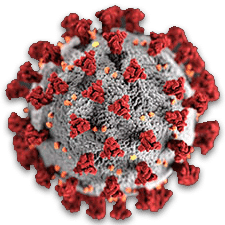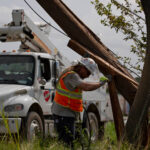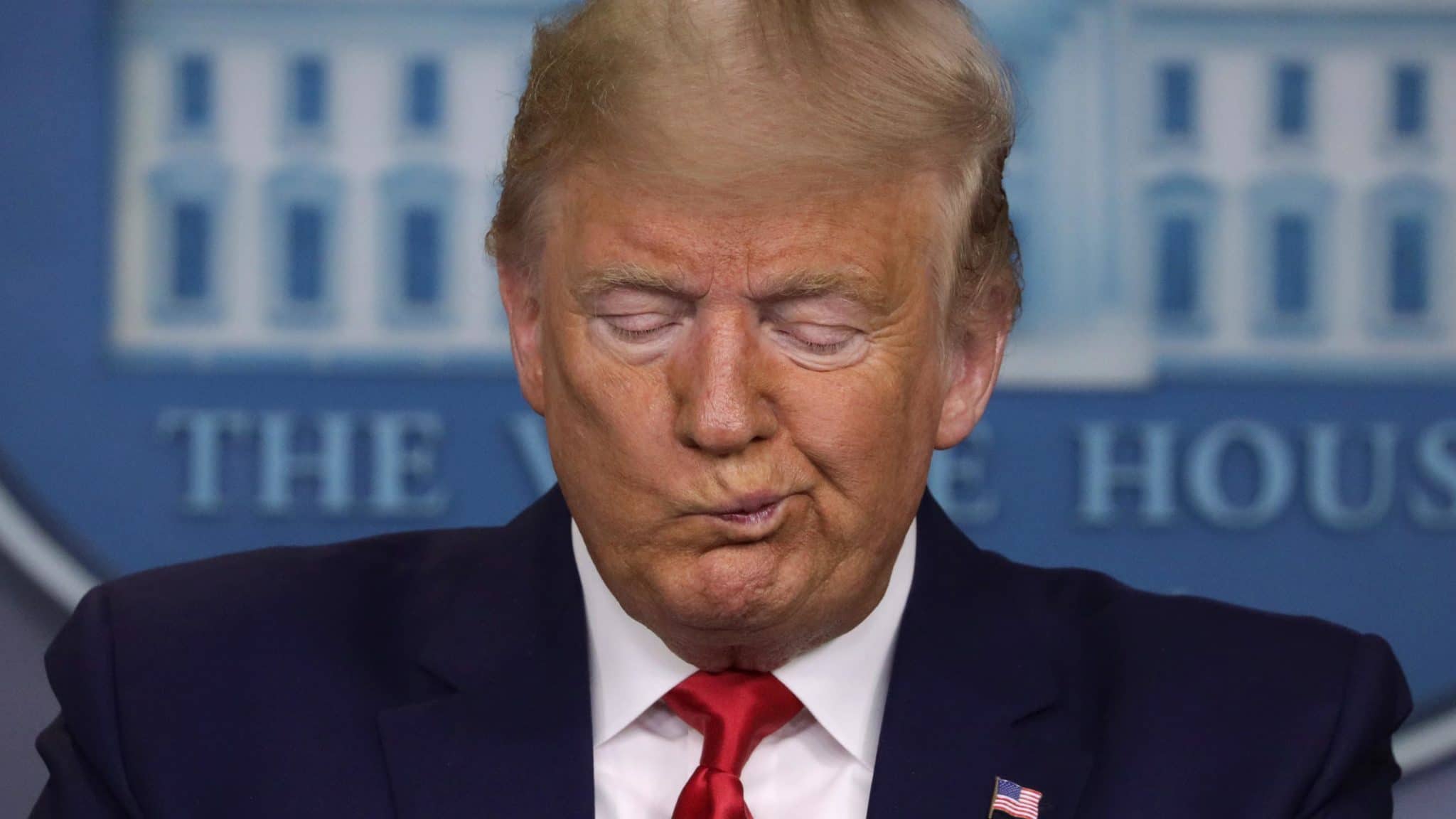The short but tragic history of the federal government’s response to the Covid-19 crisis has been shaped by the same corporate-backed science denialism that has long been deployed by the tobacco, fossil fuel, chemical, and mining industries to fight public health and environmental regulation. That denialism has infected the body of the Republican party and now the Trump administration.
Experts in manufacturing scientific doubt on behalf of corporate polluters have been installed in influential posts, shaping the work of key government agencies. Hundreds of dedicated, career scientists have left the agencies, leaving huge gaps in expertise. World-renowned scientists were dismissed from advisory committees and important public health functions, like the National Security Council’s Directorate for Global Health Security and Biodefense, have been shuttered.
We are now reaping the consequences of the rejection of science and expertise Republican politicians and their corporate allies have sown for decades. Long before the current crisis, they belittled the science that documented the dangers of tobacco, firearms, numerous toxic chemicals and pollutants, and, of course, the atmospheric accumulation of greenhouse gases. They frequently accused public health scientists of being scaremongers seeking to advance their own careers or political ideology.
These manufacturers of doubt are instrumental in corporate campaigns to stop government efforts to protect the public from deadly products. Defenders of cigarettes were able to manufacture doubt about the scientific evidence for decades before their lies became so unconvincing that even their most stalwart defenders had to acknowledge the truth. Generous funding by the Koch family and fossil fuel companies, for instance, supported a small group of questionable scientists and promoted their rejection of overwhelming scientific consensus around climate change. The same generous funding, in the form of campaign contributions, motivated Republican politicians to embrace the science fiction of climate change denialists. Only recently, as extreme weather events and rising sea levels render the effects undeniable, have some Republican politicians acknowledged the enormity of the climate crisis.
President Trump’s response to the Covid-19 pandemic has followed a trajectory similar to the Republican party’s response to the dangers produced by the tobacco, fossil fuel, chemical, and mining industries, but telescoped over weeks instead of years: Scientists’ concerns about significant harm are met with skepticism and denial, then acknowledgement and government action only once the truth becomes overwhelmingly clear, illuminated by disaster and tragedy. The president initially rejected the scientific evidence about the transmissibility and spread of Covid-19; only when the facts became indisputable have President Trump and Republican leadership, followed by their allies at Fox News, right-wing talk radio and think tanks, accepted the truth. But these several weeks of denial and delay in mounting a comprehensive federal response may prove to have catastrophic results.
 |
Got questions or thoughts to share on Covid-19? |
To understand the powerful impact of the degradation of federal scientific leadership, compare the timeline of government actions across the globe. The rapid and deadly spread of the virus in Wuhan, China, alerted the world to the potentially devastating impact of what has become a pandemic. When the first cases appeared in South Korea, Taiwan and Singapore, those nations’ political leaders mounted rapid, comprehensive responses, implementing contact tracing and testing programs, facilitating early isolation and quarantine. New cases continue to appear in each of these countries, but their efforts have resulted in substantially flatter epidemic curves.
In contrast to the quick action by these governments, President Trump repeatedly said early on that the problem was “under control” and that the number of cases, few at the time, would soon drop to zero.
It wasn’t only President Trump who questioned the science, of course. The voices who are skilled at promoting scientific uncertainty and denialism — Fox News commentators and right-wing radio voices like Rush Limbaugh for example — downplayed the threat posed by the virus, accusing Trump’s political opponents of using it to hurt the president. The DeSmog blog has a long list of statements questioning the seriousness of the threat posed by Covid-19, made by experts at the corporate-funded think tanks and web organizations that for years have questioned the science on the climate crisis and defended the dangerous products and pollutants their sponsors produce. Having been fed a diet of anti-science rhetoric for years, it is not surprising that Republicans are far less likely to follow social distancing, hand washing, and other recommendations.
The slow and ineffectual actions by already impaired federal agencies were no doubt influenced by the lack of urgency from the White House. There was little recognition of the need to rapidly ramp up testing, or that the strategic stockpile was bereft of the necessary respirators and ventilators. As a result, it will be many weeks before the nation will have an adequate testing program or provide the personal protective equipment or ventilators our health care workers desperately need to safely diagnose and care for patients infected by the virus.
In this case, it wasn’t the Republican party’s fealty to its corporate backers that blinded the White House to good science. There is evidence that President Trump initially saw rising case numbers as a poor reflection on his leadership, likely to undermine his re-election prospects. But once he recognized it was no longer possible to wish away the epidemic, the deniers folded quickly and are now helping warn the country of the importance of controlling the virus. But rather than acknowledge that he ever held a different position, he is attempting to rewrite history, denying statements millions heard him make only weeks ago.
Unfortunately, there are other looming global catastrophes like the climate crisis and the spread of antibiotic resistant “superbugs,” threats that are happening over years rather than days. It would be heartening if President Trump and the leadership of the Republican party came to the same epiphany about these challenges, recognizing that only through concerted global actions can we slow and perhaps halt these looming disasters.
There will no doubt be many lessons of this pandemic, but one is that the public health infrastructure, highly resourced, staffed with the top scientists, and empowered to take action to reduce public health risks, is no less important than the Department of Defense in protecting the nation. A second lesson is that without a leader who recognizes the importance of science and values the advice of scientists, the health of the nation will be imperiled.
David Michaels is an epidemiologist and Professor of Environmental and Occupational Health at the Milken Institute School of Public Health. He served as Assistant Secretary of Labor for Occupational Safety and Health from 2009 to 2017 and Assistant Secretary of Energy for Environment, Safety and Health from 1998 to 2001. He is the author of "The Triumph of Doubt: Dark Money and the Science of Deception" (Oxford University Press), and he can be found on Twitter (@drdavidmichaels).












Comments are automatically closed one year after article publication. Archived comments are below.
Yes, and another example of this anti-science stance is a reduction in testing, across the board, from the EPA to the CDC. It appears that the Trump administration is trying to avoid Covid-19 testing in hopes that the pandemic will just “miraculously” go away. Will we let them get away with that?
Ventalators with electro-mechanical controls could be produced in much greater numbers, much more quickly, and for much less expense.
They would not have all the bells and whistles, but they would work just as welll…
I agree with this opinion but you forgot to include the dairy industry. A researcher with the USDA had discovered that cow’s milk increases the risk of cancers, 49% for breast cancer, consuming One glass per day. Reagan had the scientific research buried and moved that scientist to an off beat position. The dairy assoc. went on to push “health benefits” on Americans while our government (red and blue) continued recommending great consumption of milk, and Still does. FYI…Alcohol increases our risk of breast cancer by 7% per drink, 13% for post menopausal.
Mother Jones has a great article on the deceit of dairy (and republicans).
What Dr. Michaels says of those with potential financial liability for illnesses caused by environmental exposures having far too much influence over alleged “Evidence Based” science and medicine in the US, is absolutely true. Yet, I take issue that the blame for this can be laid entirely on Republican politicians or the current POTUS. If one knows history, one would know that much of the problem began under Clinton with the creation of the National Occupational Research Agenda (NORA) in 1996. https://www.cdc.gov/nora/about.html NORA’s purpose was to provide input from private sector stakeholders to cause the CDC National Institute of Occupational Safety and Health (NIOSH) to promote effective care for injured workers. Instead, several of the stakeholders represented were the industries causing the problems. The matter became even worse under Bush with “Tobacco Scientists” actually writing the directives for private sector medical associations in conjunction with CDC, NIOSH and the CDC Agency for Toxic Substance and Disease Registry (ATSDR). Obama appointed honest physicians such as Dr. Michaels and others, in policy influencing positions. But did ZERO to hold those in gov’t accountable for prior misdeeds. So now we have Trump. Some of those to whom he has been listening are the exact people who Obama and Democrat politicians should have run out of town on a rail, long ago. Dr. Michaels could tell more of this if so inclined. He was there to see it play out.
In addition, the Americans shouldn’t forget that Donald Trump declared 6 bankruptcies which never touched his own money! The USA next crisis could be this President putting the country into bankruptcy if he’s allowed to over exagerate his relief covid19 funds to coorperations and businesses without garantees! Powers given to this President is like giving a loaded gun to a child! Thank god there is a Congress!!!
Hello, after reading part of your article, l feel quite uncomfortable and unnerved. That cretins like you have in important positions are not laughed out of office. There is the saying ‘ you can fool some of the people, some of the Time, But NOT ALL THE PEOPLE, ALL OF THE TIME. ‘ I really despair at times with Donald Trump, he is arrogant to the enth degree, l have found in my Long life ‘people who are arrogant are usually Ignorant as Well, ‘ the two character DEFECTS run Parallel. Donald Trump takes his Defects to the most Highest Level, FACT I Feel incredibly very sad and sympathetic to the Great people of the United States, for all the innocent and good people who might Die, because of his Total Arrogance and Abundant Ignorance, that Do Not suit his way of accepting Knowledge from Professional and Gifted People, who are doing Their Very Best to Help ALL OF HUMANITY, all over the WORLD, Thank You ALL. Kind Regards,
Rose Jelley United Kingdom.
Provide observational data and scientifically valid line of argument proving that most of the 20th century and future climate warming was / will be caused by burning fossil fuels.
Simple: Remove the blinders so you can really see
Amen brother. It’s easier to disbelieve.
I’m glad your opinion doesn’t count in making decisions.
Jesus over science. Hasnt worked throughout history
Trump doesnt need to worry about science, Hes smarter than the generals the scientists the doctors. God prayer and corporate America will take care of everything,
My god you all are obsessed with bringing down this administration as well as dividing this nation during a crisis. We are at war with a silent killer and your blaming a decisive leader who reports the complex logistics, while your generation thinks nothing about in protected sex and contracting and carrying a virus that is less likely to kill those under 37 yet are infecting everyone one else. Still hanging on the empty promises of the DNC .
Moronavirus has a firm hold on the Commander & Chief! The only question that needs investigation is did he bring it with him to the Republian Party or did they infected him on arrival?
Don’t you just feel sorry for those who feel they are smarter than a billion who defeated the deep state at there own game. Only a moron can defeat a bunch of morons.
This article is completely contrary to what I’ve been seeing.
Your kidding right, Trump has been pro active, tired of your journalistic lying. Cant you see this is a world epidemic. But in your brain lies a fool that just keeps lying, a liberals way
proactive [one word]…. after FOUR MONTHS of delay.
Oh, nonsense…?
This article is dead on
This article is putting 30 to 40 years of political actions on Trumps back. Typical of your sky is called mental blocks to color all who disagree as racists, deniers, political extremists etc. When you have nothing hate the story of the day… That’s why you have a following of four (4)… Check my last. Three (3) in two seconds..
The “bungled job” is fabricated out of nothing and if this was true the United States would look like China or Italy! Your either a died in the wool leftists or a propaganda machine shill for AP or DNC itself! Shows me factless empty charges are just that. Useless baseless talking point 3 months late. You most likely called our President (Trump) as racist when he unilaterally closed their borders at that time. Just who the heck are you? What’s your beef with trying to get this stopped in its tracks.. ???
again?
Enjoy America thanks to the govt for perfecting cronyism and making it a science
WTH does Firearms have to do with science? An dont say Science created firearms..true in some respects…but that’s not what I’m talking but here. I dont think Science said..”dont make guns, because crazy people will kill innocent people…beware!” BS. Maybe science should figure out how stop people from killing people and good people would not need guns.
Hit job articles get what they deserve. Love me 1000 times @potus 2020
Blocking your rag from all my news aggregators. Have fun in hell.
Denial seems to be the order of the day
in the good oul US of A
I’m a man of few words. More liberal BS